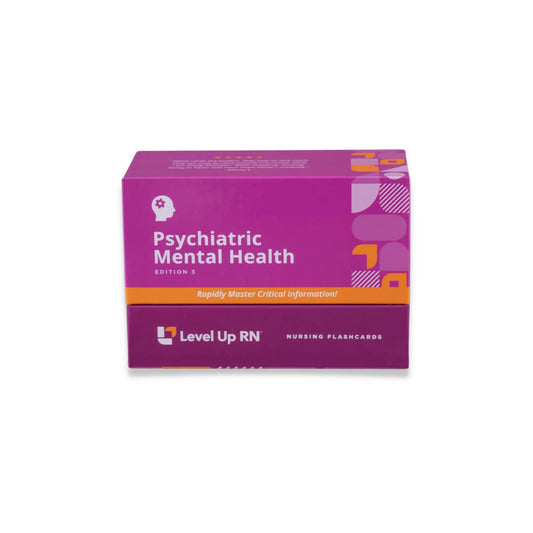Psychiatric Mental Health, part 31: Disorders - Personality Disorders
Personality disorders including: paranoid, schizoid, schizotypal, antisocial, borderline, histrionic, narcissistic, avoidant, dependent, & obsessive-compulsive
Full Transcript: Psychiatric Mental Health, part 31: Disorders - Personality Disorders
Full Transcript: Psychiatric Mental Health, part 31: Disorders - Personality Disorders
Hi, I'm Cathy with Level Up RN. In this video, we are going to talk about personality disorders. Specifically, we're going to talk about 10 of them. So if you have our Level Up RN Psychiatric Mental Health Nursing Flashcards, pull them out so you can follow along with me. And at the end of the video, I'm going to give you guys a little quiz to test your knowledge of some of the key points I'll be covering. So definitely stay tuned for that.
Personality disorders are grouped into clusters.
So cluster A includes odd, reclusive or eccentric behaviors.
So a patient with a paranoid personality disorder will be overly distrustful and suspicious.
A patient with a schizoid personality disorder will have a blunt affect, will be reclusive, and will have difficulty forming relationships.
And an individual with a schizotypal personality disorder will have bizarre speech and behavior, as well as magical thinking and visual disturbances. This is very similar to schizophrenia, but psychotic episodes will be less intense and less frequent.
Cluster B personality disorders are characterized by impulsive and dramatic behavior. And the disorders within cluster B are probably the most important ones to know for your nursing school exam.
So an antisocial personality disorder sounds like someone who just doesn't like to be around other people, but that is not the case. A person with an antisocial personality disorder violates social norms. They often have a history of physical violence and animal cruelty, and they are aggressive, reckless, and manipulate others.
An individual with borderline personality disorder has intense mood swings and views things in extremes. So things are either all good or all bad, which is indicative of the splitting defense mechanism. So I would definitely remember that borderline personality disorder and splitting go hand in hand. Individuals with borderline personality disorder often have unstable relationships, and they are at higher risk for self-harm and suicide.
A patient with histrionic personality disorder likes to be the center of attention. They tend to be seductive and provocative, and they have exaggerated emotions.
And then, finally, someone with a narcissistic personality disorder will have a grandiose sense of self. They will expect special treatment from others, but they will take advantage of others without any empathy.
Personality disorders in cluster C are characterized by anxious or fearful behaviors.
So an individual with an avoidant personality disorder will have low self-esteem and avoid social relationships due to fear of rejection.
An individual with dependent personality disorder will rely on others for everything. This includes decision-making, physical needs, as well as self-worth. They are very much focused on pleasing others.
And then individuals with an obsessive-compulsive personality disorder will be inflexible and anxious. These individuals are rule followers, they're perfectionists, and they have a difficult time forming relationships with others.
All right. It's quiz time. In this particular quiz, I'm going to have you name that personality disorder. And I have four questions for you.
Question number one. Which personality disorder is characterized by impulsiveness, splitting behavior, and an increased risk for self-harm and suicide?
The answer is borderline personality disorder.
Question number two. Which personality disorder is characterized by seductiveness, exaggerated emotions, and the need to be the center of attention?
The answer is a histrionic personality disorder.
Question number three. Which personality disorder is characterized by aggression, recklessness, and the manipulation of others?
The answer is antisocial personality disorder.
And then question number four. Which personality disorder is characterized by reliance on others for decision-making, physical needs, and self-worth?
The answer is a dependent personality disorder.
Okay. I hope you found this video to be helpful. If so, be sure to hit that like button. Take care and good luck with studying.



1 comment
you’re amazing